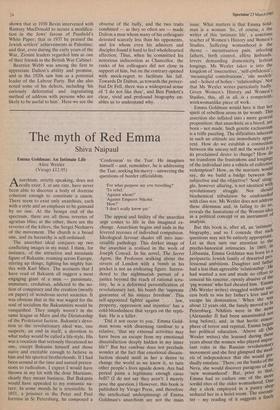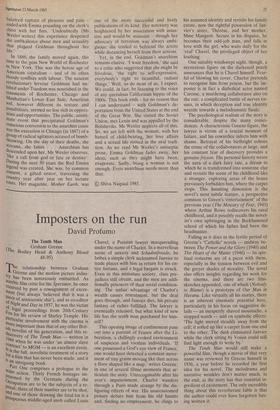The myth of Red Emma Shiva Naipaul
Emma Goldman: An Intimate Life Alice Wexler (Virago £12.95)
Anarchism, strictly speaking, does not really exist. I, at any rate, have never been able to discover a body of doctrine coherent enough to constitute a canon. There seem to exist only anarchists, each with a style and an emphasis to be gainsaid by no one. At the benign end of the spectrum, there are all those reveries of agrarian bliss; at the other, there are the reveries of the killers, the Sergei Nechaevs of the movement. The church is a broad one, and its hierarchy is self-ordained.
The anarchist ideal conjures up two conflicting images in my mind. I think, for instance, of the attractive and messianic figure of Bakunin, roaming across Europe, stirring up things, fighting his mighty bat- tles with Karl Marx. The accounts that I have read of Bakunin all suggest a most engaging giant of a man — passionate, immature, credulous, addicted to the no- tion of conspiracy and the creation (mostly on paper) of wondrous secret societies. It was obvious that in the war waged for the soul of socialism the Bakuninists would be vanquished. They simply weren't in the same league as Marx and the Dictatorship of the. Proletariat faction. Bakunin's devo- tion to the revolutionary ideal was, one suspects, an end in itself; a devotion to what today would be called a life-style. His was a vocation that seriously threatened no one, except Bakunin himself and those naive and excitable enough to believe in him and his spectral brotherhoods. If I had been around at the time and nursed preten- sions to radicalism, I expect I would have thrown in my lot with the dour Marxians; clearly they meant business. But Bakunin would have appealed to my romantic na- ture. In some moods he is irresistible. In 1851, a prisoner in the Peter and Paul fortress in St Petersburg, he composed a 'Confession' to the Tsar. He imagines himself – and, remember, he is addressing the Tsar, seeking his mercy – answering the questions of border officialdom.
Tor what purpose are you travelling?'
'To rebel.'
'Against whom?'
'Against Emperor Nikolai.'
'How?'
'I don't really know yet.'
The appeal and futility of the anarchist urge comes to life in this imagined ex- change. Anarchism begins and ends in the fevered recesses of individual compulsion. Ideological fervour shades off into inac- cessible pathology. This darker image of the anarchist is realised in the work of Joseph Conrad. In his novel, The Secret Agent, the Professor walking about the streets of London with a bomb in his pocket is not an endearing figure. Surren- dered to the nightmarish pursuit of a justice beyond the reach of rational scru- tiny, he is a deformed personification of revolutionary lust, his bomb the 'supreme guarantee of his sinister freedom'. This self-appointed fighter against ‘. . . law, property, oppression and injustice' has a cold-bloodedness that verges on the repti- lian. He is a killer.
`Did it not occur to you,' Emma Gold- man wrote with disarming candour to a relative, 'that my external activities may have been an escape from my emotional dissatisfaction deeply hidden in my inner life?' But her candour does not preclude wonder at the fact that emotional dissatis- faction should instil in her a desire to change the world as we know it, to turn other people's lives upside down. Are bad period pains a legitimate enough casus bent? (I do not say they aren't: I merely pose the question.) However, this book is published by Virago Press, and therefore the intellectual underpinnings of Emma Goldman's anarchism are not the main issue. What matters is that Emma cold- man is a woman. So, of course, is the writer of this 'intimate life', a sonetime teacher of Women's History and Women's Studies. Suffering womanhood is the theme – menstruation pain, infeeling fathers, birth control, effete lusbands, lovers demanding domesticity lesbian longings. Ms Wexler takes ui into the kingdom of 'insecurities', `self-onfidence', `meaningful contributions', 'role models' and – holiest of holies – `relatioiships'. Not that Ms Wexler writes particilarly badly. Given Women's History aid Women's Studies, this, all in all, is I competent, workwomanlike piece of wo.k. Emma Goldman would have it that her spirit of rebellion arose in tie womb. This assertion she inflated into i more general proposition: that anarchists, as a breed, are born – not made. Such geretic exclusivism is a trifle puzzling. The difficulties inherent in such an attitude are immediately appa- rent. How do we establish a connection between the uneasy self and the world it is its proclaimed desire to change? How do we transform the frustrations and longings of the individual into a vehicle of collective redemption? How, as the marxists would say, do we build a bridge between the subjective and the objective? 'Soul' strug- gle, however alluring, is not identical revolutionary struggle. Nor should biochemical tribulation be confounded with class war. Ms Wexler does not address these dilemmas and, in failing to do so, reveals the limitations of the Woman-idea as a political concept or an instrument of analysis. with But this book is, after all, an 'intimate' biography, and so I concede that such questions may not be entirely appropriate. Let us then turn our attention to the psycho-historical intimacies. In 1869, in Lithuania, Emma Goldman was born to a peripatetic Jewish family of thwarted pro- fessional ambitions. Daughter and father had a less than agreeable `relationship'. He had wanted a son and made no effort to conceal his rancour, openly abusive of the `pig woman' who had cheated him. 'Emlua (Ms Wexler writes) struggled without suc- cess both to win her father's love and to escape his domination.' When she was about 12 years old, the family moved to St Petersburg. Nihilists were in the news (Alexander II had been assassinated not long before), and, in that hectic atmos- phere of terror and reprisal, Emma bee her political education. 'Above all (ma Wexler writes) she learned during these years about the women who played impor- tant roles in the Russian revolutionary movement and she first glimpsed the mod- els of independence that she would gra- dually emulate.' There, on the banks of the Neva, she would discover paragons of the `new womanhood'. But, prior to that, Emma had to endure one of the more sordid rites of the older womanhood. One day a clerk employed in a pastry shop seduced her in a hotel room. The encouu. ter – my reading of it suggests a fmelY
balarr:ed rapture of pleasure and pain ended with Emma pounding on the clerk's, chest with her fists. 'Undoubtedly (Ms Wexler writes) this experience deepened the ambivalence about men and sexuality that plagued Goldman throughout her life.'
In 1886, the family moved again, this time to the grim New World of Rochester in New York. This was the heroic age of American capitalism - and of its often bloody conflicts with labour. The nascent revolutionary fervour Goldman had im- bibed under Tsardom was nourished in the tenements of Rochester, Chicago and Manhattan's Lower East Side; American soil, however different its texture and Possibilities, seemed no less rich in oppres- sions and opportunities. The public, uninti- mate event that precipitated Goldman's conscious conversion to the anarchist cause was the execution in Chicago (in 1887) of a group of radical agitators accused of bomb- throwing. On the day of their deaths, she screams, she faints . . . Anarchism has descended upon her, Ms Wexler observes, `like a call from god or fate or destiny'. During the next 30 years the Red Emma legend was created. She was, by common consent, a gifted orator, traversing the country year after year on her lecture tours. Her magazine, Mother Earth, was
one of the more successful and lively publications of its kind. Her notoriety was heightened by her association with assas- sins and would-be assassins - though her advocacy of terrorism was always ambi- guous: she tended to befriend the actors while distancing herself from their actions.
Yet, in the end, Goldman's anarchism remains elusive. 'I want freedom,' she said to a critic who suggested that she might be frivolous, 'the right to self-expression, everybody's right to beautiful, radiant things.' Well, so do most of us, I expect. We could, in fact, be listening to the voice of any querulous Californian hippie of the 1960s. This book ends - for no reason that I can understand - with Goldman's de- portation from the United States at the end of the Great War. She visited the Soviet Union, met Lenin and was appalled by the Bolsheviks. Ms Wexler neglects all of this. So, we are left with the woman, with her hatred of child-bearing, her love affairs and a sexual life rooted in the oral tradi- tion. As we read Ms Wexler's antiseptic prose, Emma Goldman fades away, her ideas, such as they might have been, evaporate. Sadly, being a woman is not enough. Even anarchism needs more than that.
© Shiva Naipaul 1985.















































 Previous page
Previous page